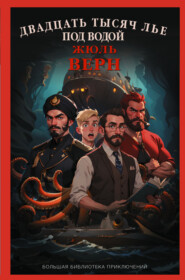По всем вопросам обращайтесь на: info@litportal.ru
(©) 2003-2024.
✖
Round the World in Eighty Days
Настройки чтения
Размер шрифта
Высота строк
Поля
"Have you a boat ready to sail?" asked Mr. Fogg.
"I have. A pilot-boat, No. 43; the best in the harbour."
"Can she sail fast?"
"She can make eight or nine knots an hour, or more. Would you like to see her?"
"Yes."
"You will be pleased, I am sure. Is it for a trip that you require her?"
"Somewhat more than that; for a voyage."
"A voyage?"
"I want you to take me to Yokohama."
The sailor folded his arms and looked steadily at Mr. Fogg. "Is your honour serious?" he said.
"Yes. I have lost the Carnatic, and I must be at Yokohama on the 14th, at latest, to catch the steamer for San Francisco."
"I am very sorry," replied the pilot, "but it is impossible."
"I will give you a hundred pounds a day and a bonus of two hundred pounds, if you arrive in time."
"Are you in earnest?" asked the pilot.
"Very much so," replied Mr. Fogg.
The pilot took a turn up and down the wharf; he looked out to sea, and was evidently struggling between his wish to get the money and his fear of venturing so far. Fix, all this time, was on tenter-hooks.
Mr. Fogg turned to Mrs. Aouda, and asked her if she were afraid.
"Not with you, Mr. Fogg," replied the young lady.
Just then the pilot returned, twirling his hat in his hands.
"Well, pilot?" said Mr. Fogg.
"Well, your honour," replied the pilot; "I cannot risk my life, or my men, or even you in such a voyage, in so small a ship, at this time of year. Besides, we could not get to Yokohama in time. It is one thousand six hundred and fifty miles away."
"Only one thousand six hundred," said Mr. Fogg.
"Oh, it is all the same." Fix breathed again. "But," continued the pilot, "we might manage it in another way."
Fix scarcely dared to breathe.
"How do you mean?" asked Fogg.
"By going to Nagasaki, which is only eleven hundred miles, or to Shanghai, which is eight hundred. In the latter case we shall be able to keep close in-shore, and have advantage of the current."
"But," replied Fogg, "I must take the American mail steamer at Yokohama, and not at Shanghai or Nagasaki."
"Well, why not?" replied the pilot. "The San Francisco does not start from Yokohama; it starts from Shanghai, and only calls at Yokohama and Nagasaki."
"Are you quite sure of that?"
"Certain."
"And when does she leave Shanghai?"
On the 11th, at seven o'clock in the evening. So we have four days, which are ninety-six hours; and at the rate of eight knots an hour, if the wind hold, we shall be able to reach Shanghai in time."
"And when will you be able to start?"
"In an hour. I only want to buy some provisions and bend the sails."
"Well, it is a bargain. Are you the owner?"
"Yes; my name is John Bunsby, owner of the Tankadere."
"Would you like something on account?"
"If convenient to your honour."
"Here are two hundred pounds. Sir," continued Fogg, turning to Fix, "if you would like to take advantage of this opportunity – "
"Thank you, sir," replied Fix. "I was about to beg the favour of you."
"Well, then, we shall be ready in half an hour."
"But what shall we do about the servant?" said Mrs. Aouda, who was much distressed at Passe-partout's absence.
"I will do all I can for him," replied Fogg; and while they directed their steps towards the police-office. Fix went on board the pilot-boat. Phileas left the description of his servant with the police, and a sum of money to be spent in seeking him. The same formality was gone through at the French Consulate; and then procuring their luggage, which had been sent back to the hotel, they went down to the wharf.
Three o'clock struck; the pilot-boat No. 43 was ready to start. She was a pretty little schooner, about twenty tons, built for speed, like a racing-yacht. She was as bright and clean as possible, and Bunsby evidently took a pride in his little craft. Her masts raked rather. She carried foresail and the usual sails for a ship of her tonnage. She could evidently make good way, as indeed she had proved by winning several prizes.
The crew consisted of the owner and four other men, all well acquainted with the neighbouring seas, which they scoured in search of ships wanting pilots. John Bunsby was a man of about five-and-forty, vigorous and full of decision and energy, calculated to reassure the most nervous passengers.
Phileas Fogg and Mrs. Aouda went on board, where they found Fix already installed. The accommodation was not extensive, but everything was clean and neat.
"I am sorry I have nothing better to offer you," said Mr. Fogg to Fix. The latter bowed without replying, for he felt somewhat humiliated in accepting Mr. Fogg's kindness under the circumstances.
"At any rate," he thought, "if he is a rascal he is a very polite one."
At ten minutes past three the sails were hoisted, the English flag was run up to the peak; the passengers took a last look at the quays in the hope of descrying Passe-partout, but they were disappointed. Fix was somewhat afraid that some chance might bring the lad whom he had treated so badly in that direction, and then an explanation would surely have ensued of a nature by no means satisfactory to the detective. But the Frenchman did not turn up, and no doubt he was still under the influence of the opium.
So John Bunsby stood out to sea, and the Tankadere, with the wind on the quarter, went bounding briskly over the waves.

















